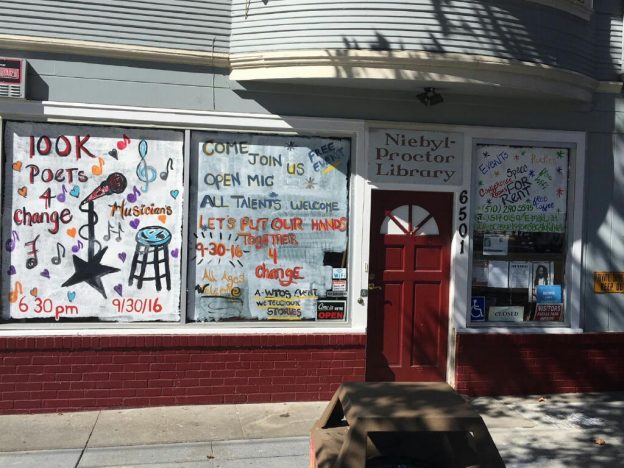By Marilyn Bechtel
OAKLAND, Calif. – Poetry, music and film came together Sept. 30 as artists and community gathered at the Niebyl-Proctor Marxist Library to join in 100,000 Poets for Change, a celebration of artists around the world who are working for peace, economic and social justice.
The celebration was one of many in the San Francisco Bay Area, with hundreds more held in many countries during late September.
The program featured celebrated Caribbean percussionist and singer Val Serrant, who opened the program and performed several times during the evening.
Serrant was joined by area poets, whose works dramatize the issues facing working and poor people today.
Roxanne Jones’ poem told of the troubles of growing up with an impoverished single mother: “Have you seen it? Three days later, we faced syrup sandwiches because my mother hadn’t received the welfare check. I’d hear her say Hi to the mailman, and ask me to look in the mailbox to see if the welfare check had arrived. No, shit!”
Lupe Copendah wrote of the young cab driver she met while volunteering with Oakland’s Senior Companion Program. “Your eyes are like midnight, and your heart is like gold. You are my treasure to behold, and I shall call you, Midnight Gold … You are Muslim, I’m a Christian, but we bonded as two friends…We have kept each other just as we are…”
In her poem, Courtney shared her story of living with drug addiction: “… my world is twirling, so I shoot you into my veins. Now, life is art, a living painting …” She now has a non-profit in San Francisco where she works to help homeless youth find “other avenues like art and media and social justice and change in our community, other than drug use.”
Film held a central place in the program. The evening’s MC, Cassandra Lόpez, “Mama Cassie” to the community, introduced the collective producing the film work-in-progress, “We Tell Our Stories: This Side of Oakland,” led by writer and activist Lyndsey Ellis. A short clip featured Layloni Marshall, a young single mother of three, who, with help from the community, was recently able to graduate from San Francisco State University with a Bachelor’s Degree in Sociology.
“… be true to yourself,” Marshall says in the film. “That’s something I had to learn. I had to learn that no matter what people say, it doesn’t matter if you know who you are, and why you’re here. No matter what anybody says, if you want to do something, do it! This is your life, you are going to have to live this life.”
Also featured was a short clip from Alsenosi Adam’s film, Losing Oakland, an award-winning exploration of gentrification Adam made while a journalism grad student at UC Berkeley.
The clip begins with Adam telling host Kenny Choi of CBS TV’s Bay Sunday that his film seeks to look at what’s happening in West Oakland, “from a different angle, so we can really have a healthy discussion about gentrification, which is happening all over the world.”
Adam said that as he interviewed local people for a reporting class, he kept hearing, “Oakland is changing, Oakland is not what it used to be…and I set out to make a film about housing, a lot of people losing homes, and it was more than that – it was a community that is breaking down, that’s in fear of losing their homes. I wanted to tell it so it makes a difference, and that’s how I came to do Losing Oakland.”
Adam told how Lόpez – who is featured in the film – came from Detroit to San Francisco, and then to Oakland, in the late 1960s. “She loves Oakland; to her Oakland used to be a black community hub. And as she taught in the schools, she saw in time how our community is getting pushed out and broken down. Now,” he said, “she runs a library in West Oakland where she holds round-table discussions with African American community members, where they talk about the issues facing the community, like how they can stay in this ever-changing city.”
In the film, Lόpez says, “My biggest fear is that Oakland will lose its diversity and its class composition, that it will become like San Francisco. I like Oakland.”
The film also highlights the new people – largely white and younger – who are moving into Oakland as housing costs soar around the region, and who see the city as a good place to settle and build a new life.
Adam says he felt people going through gentrification are “talking at each other, not with each other…You set a table for an intelligent conversation when they meet somewhere.”
Lifelong Oaklander Swakemyua Mohammad followed his poem with a plea for fundamental changes in today’s society. “When we become older, we become wiser, and we see the way this (corporate) system is set up, it is doing exactly what it is meant to do. … Until we put a face on the true enemy in our society, day in and day out, we will never defeat that enemy. It’s not a race thing – it’s a human thing, a human condition, who we are as human beings.”
The evening ended with the audience viewing a video, Why We Vote, prepared by a group of young people as a call for audience members to not only vote themselves, but to make sure family and friends are registered and go to the polls on Nov. 8.

